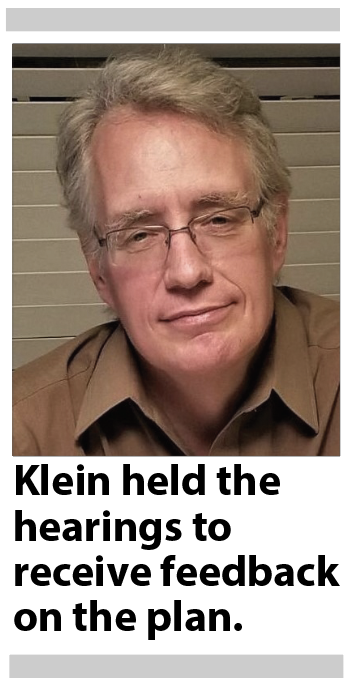City councilman, officials meet with residents to go over proposed changes
City Councilman and Del Mar College history professor Jim Klein held two public hearings at Heritage Campus on Feb. 7 and Feb. 9 to discuss the City Council’s proposed changes to the city’s drought contingency plan.
The hearings were also attended by the chief operating officer for water utilities, Mike Murphy; the city’s water resource manager, Estabon Ramos; and Corpus Christi Water’s community outreach specialist, Erin Hawkins.

Klein held the hearings to receive public comment on the proposed changes to the city’s drought contingency plan. The proposed changes are as follows:
— The revised stage 1 restrictions will restrict all forms of watering and irrigation, including drip irrigation, between the hours of 10 a.m. and 6 p.m.
— The revised stage 2 restrictions will have an earlier trigger condition, triggering when the combined water levels of Lake Corpus Christi and the Choke Canyon Reservoir are at 35%, rather than the prior 30%. All forms of watering and irrigation, including drip irrigation, will also be limited to once every other week.
— The revised stage 3 restrictions will have an earlier trigger condition, triggering when the combined water levels of Lake Corpus Christi and the Choke Canyon Reservoir are at 25%, rather than the prior 20%.
The Feb. 9 hearing was attended by multiple local activists, such as Carrie Meye with the North Beach Community Association, Ana Trevino with the Texas Campaign for the Environment and Maggie Peacock and Armon Alex with EarthEcho International. Alex is also the vice-chair of the mayor’s Environmental Task Force.
A common concern voiced during the hearing was about the burden of industry on the water supply and whether large volume water users, businesses and institutions that use more than 10 million gallons of water per year, were paying their share into the system.
According to the officials present, eight of the city’s 10 large volume users take part in a voluntary exemptions program, which allows them to pay a fee of 25 cents per thousand gallons of water used. In return, these users are exempted from certain drought restrictions. The money collected from this program is put toward securing other sources of water for the city, such as funding the construction desalinization plants and securing local aquifers.
Some community members, such as Peacock, proposed that the city should make the fees mandatory.
Members of the community also brought up proposals for the city to prioritize the collection of rainwater, but city officials responded that, due to the city’s semi-arid environment, it would not be an efficient water source. Individual households are permitted to collect rainwater if they so wish, as long as any installed collection systems abide by city regulations and standards.
Lastly, members of the community voiced a desire for more expansive distribution of information related to the drought contingency plan and greater community input in the city’s water management. City officials explained their current plans to disseminate information through signage, social media, and advertising the plan on television and radio.
The attending activists and community members proposed the city form a public water committee that would grant the public a permanent voice on water policy.





